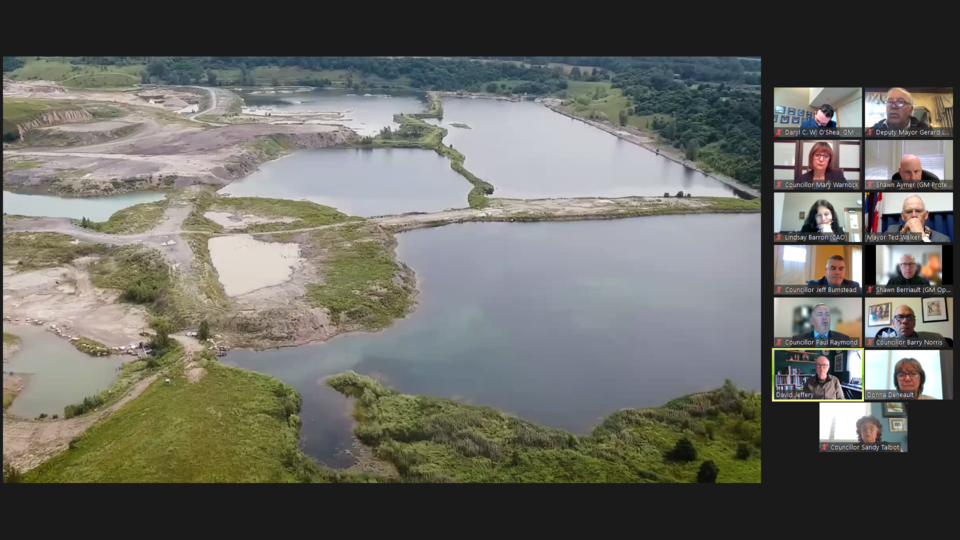Tiny is waiting for a study to reveal if and how the water tables have turned.
At a recent committee of the whole meeting, Tiny council discussed a previous deputation by David Jeffrey, who represented the Reform Gravel Mining Coalition, in regards to council’s support of a temporary moratorium on further new and expansion of aggregate permits.
Last month, Jeffrey shared information and a presentation to Tiny regarding the impacts of gravel mining and its relation to climate change across the province. Part of Jeffery’s research included a look at the online pits and quarries interactive map provided by the Ontario Ministry of Northern Development, Mines, Natural Resources and Forestry (NDMNRF).
The township currently has nine properties classified and assessed as gravel pit/quarry/sand pits by MPAC, including two aggregate wash water facilities: Teedon Pit owned by Dufferin Aggregates at 40 Darby Road, and Waverley Pit No. 2 owned by Sarjeant Company Ltd at 1379 Baseline Road South.
A previous moratorium aimed specifically at Waverley Pit No. 2 was requested to Tiny council last year, with council looking forward to a groundwater study by University of Alberta professors Mike Powell and William Shotyk that would examine what was described as water “cleaner than ancient arctic ice” in the township.
Discussion at the recent meeting involved Mayor George Cornell openly questioning the progress status of Powell and Shotyk’s proposed study, noting that it would be in council’s best interest to wait on the study before moving forward with Jeffrey’s request.
Coun. Gibb Wishart also looked forward to the study findings, and how industrial operations of aggregate mining affected Tiny’s groundwater as weighed against operations in less-populated areas of the province.
“There are gravel pits that are using water that is pretty ordinary, a long way away from residential and farm uses,” Wishart explained. “And there are gravel pits, like the one that we’re saddled with, that are affecting water used by residents and homeowners.
“We’ve got to recognize that there has to be a means to control when there are differences that affect people,” Wishart added.
Coun. John Bryant raised the question of rehabilitation for older properties in Tiny, before minimum requirements were put in place under the Aggregate Resources Act (ARA).
“There are at least two pits where the licence was surrendered because they were no longer mining that operation,” replied planning director Shawn Persaud, “and we’ve redesignated those lands under the OP process and will be rezoning those lands under the zoning process.
“The two applications we’ve dealt with in the last 15 years, there are very detailed rehab plans that are part of those approvals where it’s more of a staged approach; so as they continue to mine the pit, they have to also continue to be rehabilitating behind that mining so that it’s not all rehabilitated at the very end,” Persaud said.
Council was concerned by the understaffed status of NDMNRF and the delay in responding to requests, with suggestions put forward by Cornell and other members of council and staff to present delegations at the 2022 Association of Municipalities of Ontario conference, specifically addressing the aggregate permit and notification process and a tax assessment review of aggregate companies.
Tay council also received a deputation by Jeffrey on behalf of the coalition that same day, providing similar content as with the Tiny deputation earlier in the month.
“Tay Township has six gravel pits or quarries, with a little bit less than 800,000 metric tons licensed,” Jeffrey shared to council, citing the NDMNRF online map. “And if all of that tonnage were extracted each year, there’d be 60,000 tandem trucks travelling along Tay Township roadways.”
Coun. Barry Norris admitted he was unsure of Jeffrey’s request, stating that many of the coalition concerns were addressed within the ARA, and asking what the real request was.
Jeffrey responded that the provincial government had provided loopholes for gravel mining operations to bypass issues, resulting in power being taken away from municipalities for what happens in their boundaries.
“We want to see the act enforced, we want to see it strengthened,” Jeffrey stated.
Mayor Ted Walker thanked Jeffrey for the deputation, and noted that the matter would be brought forward to a future meeting of Tay council.



